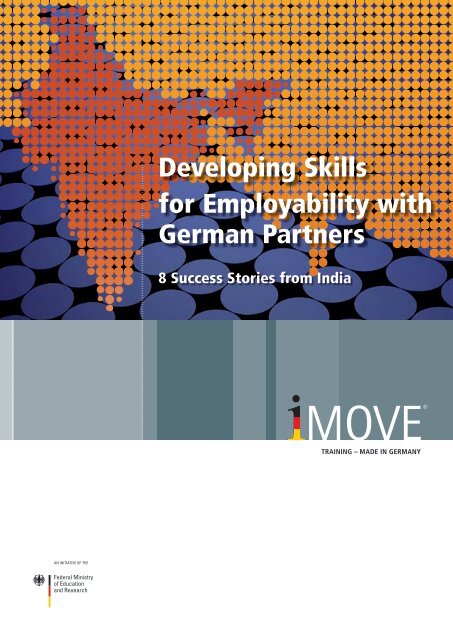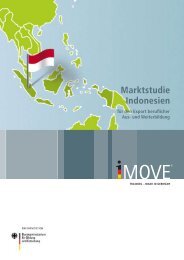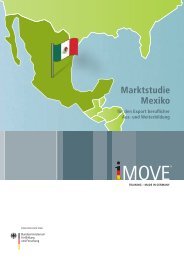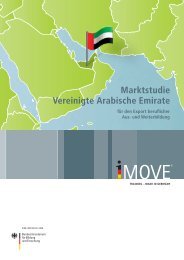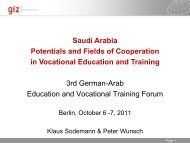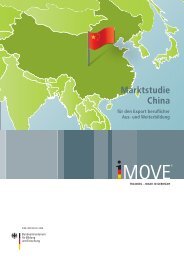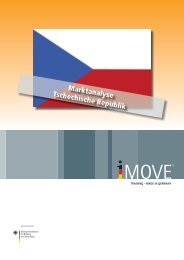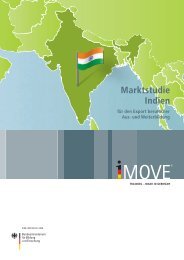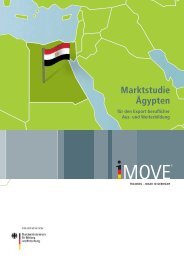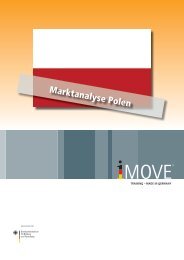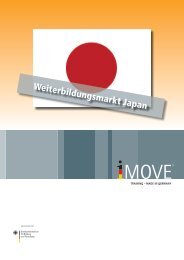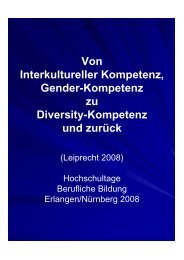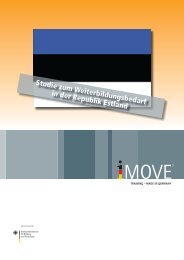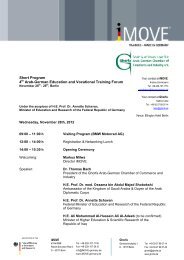Developing Skills for Employability with German Partners - iMove
Developing Skills for Employability with German Partners - iMove
Developing Skills for Employability with German Partners - iMove
Create successful ePaper yourself
Turn your PDF publications into a flip-book with our unique Google optimized e-Paper software.
<strong>Developing</strong> <strong>Skills</strong><br />
<strong>for</strong> <strong>Employability</strong> <strong>with</strong><br />
<strong>German</strong> <strong>Partners</strong><br />
8 Success Stories from India
Contents �<br />
Imprint 4<br />
Preface 5<br />
Festo Didactic –<br />
Industry-owned turnkey solutions <strong>for</strong> learning systems 6<br />
Chamber of Skilled Crafts Rhein-Main –<br />
Modernisation projects <strong>for</strong> India‘s vocational education and training system 8<br />
Volkswagen Academy –<br />
Implementation of transnational standards 10<br />
GL Academy –<br />
Advanced training in the maritime industry 12<br />
Siemens Technik Akademie (STA) Berlin –<br />
<strong>Skills</strong> certification <strong>with</strong> partner schools 14<br />
Berufsförderungswerk (BFW) Bau Sachsen e. V. –<br />
Industry-oriented training of vocational school teachers 16<br />
MACHWÜRTH TEAM INTERNATIONAL (MTI) –<br />
Customised development and implementation of training and consulting 18<br />
Indo-<strong>German</strong> Chamber of Commerce (IGCC) –<br />
Practice-oriented management programme as win-win plat<strong>for</strong>m <strong>for</strong><br />
industry and students 20<br />
iMOVE 22<br />
3
4<br />
Imprint<br />
Publisher:<br />
iMOVE<br />
at the Federal Institute <strong>for</strong><br />
Vocational Education and Training (BIBB)<br />
Project Management:<br />
Silvia Niediek<br />
Text:<br />
iMOVE <strong>with</strong> contributions from<br />
featured organisations<br />
Photos:<br />
Cover photo: fotolia, MIC GmbH<br />
Other Photos: Contributing organisations, iMOVE<br />
Layout:<br />
MIC GmbH, Cologne, www.mic-net.de<br />
Print:<br />
A. Ollig GmbH & Co. KG, Cologne<br />
May 2011, © iMOVE. All rights reserved.<br />
iMOVE is sponsored by the Federal Ministry of Education and Research.<br />
iMOVE is responsible <strong>for</strong> the contents of this publication.
Preface<br />
A skillled work<strong>for</strong>ce is absolutely essential to become and remain a<br />
global competitor in a rapidly changing world. Demand has never<br />
been higher. India and <strong>German</strong>y are experienced and successful<br />
partners in several strategic collaborations, such as energy, environmental, world trade and education.<br />
Joint Indo-<strong>German</strong> activities can also make a major contribution towards the advancement<br />
of skill development in India. It is projected that 500 million people will require training <strong>for</strong> India's<br />
work<strong>for</strong>ce by 2022. The Indian Government made it clear that a revolution in vocational training is<br />
needed to ensure that this huge number of workers receives adequate qualification.<br />
“Training – Made in <strong>German</strong>y” offers the necessary know-how to meet this challenge. <strong>German</strong>y<br />
has a long-standing tradition in vocational education and training and enjoys a high reputation<br />
<strong>for</strong> the demand-driven and practical orientation of its qualification programmes. The integration<br />
of professional, social and methodical competencies characterises the kind of knowledge <strong>German</strong><br />
partners can provide.<br />
The initiative iMOVE was established by the Federal Ministry of Education and Research in<br />
2001, in order to promote international business relations of <strong>German</strong> training providers <strong>with</strong> international<br />
public and private organisations. iMOVE services include a multilingual database which<br />
contains in<strong>for</strong>mation about <strong>German</strong> training providers, seminars, trainings, and trade missions<br />
abroad.<br />
This brochure presents eight success stories of skill development realised in a joint ef<strong>for</strong>t by<br />
Indian and <strong>German</strong> partners. <strong>German</strong> training services range from consulting services and standard<br />
education courses to tailor-made in-house training sessions. With its wide range of training offers<br />
and strong emphasis on employability, “Training – Made in <strong>German</strong>y“ has the potential to successfully<br />
support and promote the ongoing trans<strong>for</strong>mation process of the Indian training system.<br />
Markus Milwa<br />
Acting Director, iMOVE<br />
5
6<br />
Festo Didactic –<br />
Industry-owned turnkey solutions <strong>for</strong> learning systems<br />
Festo is a leading supplier of automation technology.<br />
It has 59 independent <strong>for</strong>eign subsidiaries<br />
and approximately 14,600 employees worldwide.<br />
In order to ensure optimum utilisation and<br />
installation of these developed technologies,<br />
Festo created training offers so that the demand<br />
<strong>for</strong> automation solutions could be optimised.<br />
To that end, in 1965, Festo founded the business<br />
unit Didactic.<br />
To begin <strong>with</strong>, vocational training schools in<br />
<strong>German</strong>y were provided <strong>with</strong> learning systems<br />
<strong>for</strong> technical qualification. In the meantime,<br />
<strong>with</strong> approximately 450 employees, Festo Didactic<br />
has become the market leader <strong>for</strong> learn-<br />
ing systems in <strong>German</strong>y and around the world.<br />
Each year more than 40,000 individuals attend<br />
seminars conducted in over 30 languages, in<br />
order to take advantage of the practice-oriented<br />
training and continuing education opportunities<br />
<strong>with</strong> experienced instructors.<br />
Cer<br />
ac<br />
India was the first country outside of Europe, in which Festo<br />
founded a subsidiary; this was in 1963. Festo Didactic has been<br />
providing training courses to companies and vocational training<br />
institutes in India <strong>for</strong> decades. Recently, more and more companies<br />
and entire sectors are planning to develop their own training<br />
centres on the sub-continent. As a result, they are seeking support<br />
from training experts. Currently, public and private vocational<br />
education and training institutes cannot meet the demand <strong>for</strong><br />
qualified staff in these companies. Consequently, the industry<br />
is leaning more and more toward meeting these demands on its<br />
own, as quickly as possible.<br />
The Shalimar Group, an Indian conglomerate, has turned to<br />
the iMOVE-initiative of the Federal Ministry of Education and<br />
Research <strong>for</strong> help in providing an expert in the field of technical<br />
vocational training and continuing education. iMOVE had previously<br />
presented its services to promote educational export to<br />
the Punjab Haryana Delhi Chamber of Commerce. As a manufacturer,<br />
Shalimar is involved in many industry sectors. These in-<br />
clude metal wire, paper and health care. Once Shalimar examined<br />
all of the offers, it chose to partner <strong>with</strong> Festo Didactic.<br />
Internet: www.festo-didactic.com
tification guarantees training quality in<br />
cordance <strong>with</strong> international standards.<br />
Festo Didactic is one of the few providers that can offer a<br />
complete package of technical vocational education and training<br />
<strong>with</strong> turnkey solutions. Other success factors include extensive<br />
international experience as well as close ties to the parent company<br />
Festo and thus to the industry.<br />
Shalimar founded the training centre SNK Institute <strong>for</strong><br />
Industrial Maintenance and Mechantronics in Manesar near New<br />
Delhi. It will be used primarily by industrial customers focusing<br />
on maintenance and automation. Festo Didactic supports SNK<br />
as a technical cooperation partner. Initially, a sector survey was<br />
conducted in order to analyse outcome expectations of the training<br />
courses. The acute demand <strong>for</strong> trained personnel was also<br />
assessed.<br />
Based on this in<strong>for</strong>mation, Festo develops courses and seminars.<br />
It also determines the technical layout of various laboratories<br />
and training rooms. The laboratory proposal currently<br />
includes metal technology, automation technology, process automation,<br />
machine technology, mechanics and welding technology.<br />
The Institute receives “FACT” (Festo Authorised and Certified<br />
Training Center) certification. It guarantees<br />
that the quality of the training, the trainers and<br />
course content has been audited in accordance<br />
<strong>with</strong> international standards.<br />
Several SNK Institutes in various regions<br />
of India are being planned <strong>for</strong> the future. In<br />
so doing, the training of skilled labour will be<br />
expanded and geared more specifically toward<br />
the acute needs of companies in the respective<br />
regions.<br />
7
8<br />
Chamber of Skilled Crafts Rhein-Main –<br />
Modernisation projects <strong>for</strong> India’s vocational education<br />
and training system<br />
The Chamber of Skilled Crafts Rhein-Main acts<br />
as a service provider <strong>for</strong> over 30,000 <strong>German</strong><br />
businesses in and around Frankfurt. These are<br />
primarily medium-sized businesses <strong>with</strong> approximately<br />
11,000 apprentices. The Chamber advises<br />
these companies on their activities abroad, on<br />
environmental issues and on vocational training.<br />
The Chamber also runs two vocational training<br />
and technology centres, where trainees from<br />
various companies can complete their training<br />
programmes. The Chamber generates annual<br />
sales of about 13 billion euros.<br />
The Chamber of Skilled Crafts Rhein-Main<br />
has been working <strong>with</strong> international partners <strong>for</strong><br />
25 years. It has provided consulting services <strong>with</strong><br />
respect to the design and layout of vocational training<br />
centres and train-the-trainer programmes in<br />
many European countries, as well as in Morocco,<br />
Ethiopia, Vietnam and Laos. This, in turn, has<br />
resulted in new cooperations between <strong>German</strong><br />
company members of the Chamber and international<br />
partners.<br />
Since August 2010, iMOVE has been supporting the Chamber<br />
of Skilled Crafts Rhein-Main in its initiation of, and partnership<br />
development <strong>with</strong>, potential interested parties in Asia, notably <strong>with</strong><br />
private enterprise organisations in India. Since then, the Chamber<br />
has maintained regular contact <strong>with</strong> experts from iMOVE. The<br />
iMOVE-newsletter alerted the Chamber to the many successful<br />
projects and cooperations in vocational education and training<br />
already realised between <strong>German</strong> and Indian partners. As a result<br />
of India’s rapid economic growth and the tremendous involvement<br />
on the part of the Indian government to qualify millions of young<br />
people, the number of <strong>German</strong>-Indian success stories surrounding<br />
vocational education and training cooperations, has also increased<br />
rapidly. This news was well-received by the Chamber. Growing<br />
awareness of a re-orientation toward the promising Indian education<br />
market was palpable at every organisational level.<br />
On India Day, which was hosted by iMOVE in the Fall of 2010,<br />
Chamber representatives met face-to-face <strong>with</strong> interested parties<br />
from India. This gave them the opportunity to determine the extent<br />
of intervention required and that the organisation could meet<br />
these needs competently. The core task of the Chambers of Skilled<br />
Crafts in <strong>German</strong>y is commercial and technical training. Thus, the
New schools will be adapted to regional<br />
economic and core sector activities.<br />
Chamber is the ideal partner when it comes to renewing vocational<br />
education and training concepts and structures.<br />
Meanwhile, the first exchange resulted in planning a long-term<br />
general agreement <strong>with</strong> the Indian company IL&FS. The Indian<br />
government has commissioned IL&FS to implement modernisation<br />
projects <strong>for</strong> India’s vocational education and training system.<br />
As a result, the programme “<strong>Skills</strong> Training in Engineering &<br />
Production Systems” (STEPS) was developed; the Chamber of<br />
Skilled Crafts Rhein-Main is involved in this project. The Chamber<br />
was able to resort to iMOVE’s consulting when it came to business<br />
development and finalising contractual agreements.<br />
During the first phase of the cooperation, three staff members<br />
of the <strong>German</strong> Chamber travel to India several times over a period<br />
of three years, in order to conduct audits of six different metalworking<br />
and building trades. The Indian government has developed<br />
short-term training programmes <strong>for</strong> young people from rural areas.<br />
Within the framework of an infrastructural plan <strong>for</strong> basic vocational<br />
competencies, qualifications should be awarded <strong>with</strong>in 30 days<br />
in the following areas: basic welding, CNC operator, fitter, masonry,<br />
carpentry and bar bending. Employees of the <strong>German</strong> Chamber<br />
Internet: www.hwk-rhein-main.de<br />
test and certify training concepts and the implementation<br />
thereof, in order to guarantee that procedures<br />
meet international standards. Teaching<br />
units are observed, the proportion of theoretical<br />
and practical training is measured, teaching<br />
materials and tools employed are monitored, as is<br />
trainer fitness. Opportunities <strong>for</strong> the youth target<br />
group to access the qualification programme is<br />
also assessed.<br />
In a second phase, the demands on the<br />
Chamber will be even stronger, conceptually:<br />
the government contract calls <strong>for</strong> 100 multi-skill<br />
schools to be set up in an infrastructural belt<br />
between New Delhi and Mumbai. The goal is to<br />
train approximately two million individuals in<br />
this region during the next ten years. Each of<br />
these schools is to cover several trades, thus<br />
meeting the needs of the main regional economic<br />
and core sector areas. A preliminary timeframe<br />
of four to six years has been established <strong>for</strong> this<br />
specific task; the Chamber of Skilled Crafts<br />
Rhein-Main is also to be involved in this project<br />
<strong>with</strong> several work packages.<br />
9
10<br />
Volkswagen Academy –<br />
Implementation of transnational standards �<br />
The <strong>German</strong> automotive manufacturer Volkswagen<br />
is strengthening its commitment in India.<br />
On October 2, 2010, the Volkswagen Group<br />
India opened its training academy in Pune.<br />
The academy provides training <strong>for</strong> apprentices,<br />
employees and dealers of Volkswagen Group<br />
brands and production plants in India. The<br />
Academy’s target group, however, also includes<br />
employees from other companies such as those<br />
of local suppliers.<br />
The inauguration was attended by Lower<br />
Saxony’s Minister President David McAllister,<br />
who visited the new Volkswagen plant in Pune<br />
accompanied by a 50-member delegation. The<br />
Chairman of the Board of Management of<br />
Volkswagen AG, Prof. Dr. Martin Winterkorn,<br />
also welcomed Mukesh Malhotra, President<br />
of the regional Chamber of Commerce, to the<br />
inauguration.<br />
The Academy is located at the Pune plant<br />
which was opened in March 2009 to build<br />
Volkswagen Group brand vehicles <strong>for</strong> the Indian<br />
market. The plant is one of Volkswagen’s most modern factories<br />
and currently has a work<strong>for</strong>ce of about 4,300. Stable growth of the<br />
Indian automotive market is projected.<br />
The Volkswagen Group is seeking to become a top employer<br />
at all of its sites worldwide. As top products can only be manufactured<br />
by top teams, Volkswagen is bringing first-class vocational<br />
training and professional development to its sites. The Volkswagen<br />
India Academy, which has 1,500 square meters of space, is<br />
furnished <strong>with</strong> seminar rooms and provides practical training in<br />
advanced vehicle and production technologies.<br />
Apart from the professional development of employees, the<br />
Academy is also the base <strong>for</strong> Volkswagen vocational training <strong>for</strong><br />
customer service personnel of more than 160 Volkswagen Group<br />
dealerships in India. The group has developed transnational<br />
standards <strong>for</strong> vocational development in recent years that are in<br />
line <strong>with</strong> the internationally recognised and highly reputed dual<br />
vocational training system of <strong>German</strong>y. The greatest strengths<br />
of these training courses are the ongoing references to demands<br />
and processes which course participants encounter during their<br />
daily practical work and ongoing guidance toward independent<br />
problem solving.<br />
Internet: www.volkswagen.co.in
The Academy was set up in cooperation <strong>with</strong> Volkswagen<br />
Coaching in Wolfsburg. The Indian trainers were educated and<br />
qualified at Volkswagen head offices in <strong>German</strong>y. To begin <strong>with</strong>,<br />
all new employees undergo basic qualifications at the Academy;<br />
ongoing training and specialisation is provided in a second step.<br />
For trainees wanting to specialise in a particular field, applicationspecific<br />
training in various technical areas and in IT is carried<br />
out. Above and beyond this, the Academy runs additional seminars<br />
on topics like soft skills and intercultural training. Managers<br />
and management trainees are trained specifically in management<br />
development programmes.<br />
The first point of contact in India <strong>for</strong> commercial vocational<br />
education and training programme providers such as the Volkswagen<br />
Academy, is the Ministry of Labour and Employment and<br />
the governmental offices responsible <strong>for</strong> vocational training,<br />
namely the Regional Directorate of Vocational Education & Train<br />
ing (DVE&T), the Directorate General of Employment & Training<br />
(DGE&T) and the National Council <strong>for</strong> Vocational Training<br />
(NCVT), and their local representatives. Since September 2010,<br />
the Volkswagen Academy has already accepted 114 trainees from<br />
nine different trades <strong>for</strong> their one-year practical apprenticeship<br />
training programme as a result of this cooperation. Another<br />
Top products can only be<br />
manufactured by a top team.<br />
important cooperation partner is the National<br />
Skill Development Corporation (NSCD) and its<br />
Automotive Sector Skill Development Council<br />
(ASDC). Deeper cooperation <strong>with</strong> the partners<br />
and ongoing joint development of the training<br />
programmes is planned.<br />
11
12<br />
GL Academy –<br />
Advanced training in the maritime industry �<br />
India is an emerging shipbuilding nation and<br />
has expanded its yards capabilities. India’s share<br />
of the global shipbuilding market is expected to<br />
increase to five per cent by 2020 from the current<br />
one per cent. Traditionally, Indian yards focused<br />
on the small and medium segments but the current<br />
orders are dominated by bulk carriers and<br />
offshore supply of boats. Indeed, Indian shipbuilding<br />
firms are expanding capacities to exploit<br />
the offshore oil exploration segment as record oil<br />
prices create huge potential <strong>for</strong> deep-sea drilling,<br />
pushing demand <strong>for</strong> rigs and service plat<strong>for</strong>ms.<br />
With most of the oil production in the next<br />
five years likely to come from offshore oilfields,<br />
exploration firms are scouting <strong>for</strong> oil-drilling rigs<br />
like shallow-water jack ups and deep water semisubmersibles,<br />
which are in tight supply.<br />
Given these aspirations, advanced training<br />
is a prerequisite <strong>for</strong> quality, safety and efficiency.<br />
Indian clients have recognised that advanced<br />
training is the key to personal, professional and<br />
corporate success. The growing demand has led<br />
GL Group, based in <strong>German</strong>y, to set up a new<br />
branch of its advanced training institute “GL<br />
Academy” in Mumbai. The GL Academy, representing<br />
a global network of 19 training institutes<br />
is known <strong>for</strong> good knowledge transfer, focus on<br />
key topics, high relevance <strong>for</strong> daily work and high<br />
trainer competence.<br />
More than 23,000 participants in over 1,500<br />
seminars worldwide have made GL Academy<br />
since 1995 into a well-established training provider<br />
<strong>with</strong>in the maritime industry which offers<br />
more than 80 different seminar topics. GL Academy has one of the<br />
broadest and most comprehensive portfolios in the industry. GL<br />
Academies in India, Greece, Cyprus, Italy, United Arab Emirates,<br />
Turkey, USA, Brazil, Peru, Mexico, China, Korea, Singapore, and<br />
Japan conducted more than 600 courses in 2010 <strong>for</strong> clients.<br />
GL Academy India was initiated in 2009. Due to the personal<br />
network of the training coordinator, GL Academy was invited to<br />
<strong>for</strong>ge cooperation agreements <strong>with</strong> various maritime and academic<br />
organisations. This approach opened the door to shipping companies<br />
in India, Sri Lanka and Bangladesh. Customized training<br />
programmes, GL-approved local trainers and up-to-date seminars<br />
combining maritime as well as offshore topics are in demand. There<br />
is a vast training potential in the oil & gas and renewable sectors.<br />
The GL Academy is well suited to cover these requirements since<br />
it can rely on the technical expertise of a classification society as<br />
well as on the expertise of an international technical assurance and<br />
consulting company <strong>for</strong> oil and gas as well as renewables.<br />
As part of the GL Group (GL) the GL Academy is able to recruit<br />
experts from the classification and certification branch or<br />
from technical assurance and consulting. GL headquartered in<br />
Hamburg, <strong>German</strong>y, employs more than 6,100 engineers, sur
Quality trainings will continue<br />
to be in high demand.<br />
veyors, experts and administrative staff in 80 countries. GL is<br />
dedicated to ensuring the safety of life and property at sea, and the<br />
prevention of pollution of the marine environment.<br />
As an independent third party, GL experts develop state of the<br />
art rules, procedures and guidance <strong>for</strong> ship owner, ship yards and<br />
the maritime supply industry in order to offer relevant answers in<br />
times of economic challenges and tight regulatory regimes. For the<br />
worldwide energy industries GL provides assurance, inspection,<br />
and consulting as well as project management in particular in the<br />
offshore area. Within its business segment renewables, GL provides<br />
technical expertise to all stakeholders in the expanding renewable<br />
energy markets, especially wind, around the world including certification,<br />
measurements and consulting.<br />
Due to the time constraints of participants, GL Academy offers<br />
a modular system of seminars which is tailored to the gaps which<br />
conventional educational institutes cannot cover. The seminar<br />
topics deal <strong>with</strong> maritime regulations and environmental protection,<br />
maritime security, marine safety management systems, ship<br />
technology, risk management and quality and environmental management<br />
systems. They arise from daily demand, following latest<br />
developments. Interactive case studies and a practical approach are<br />
an integral part of all courses. The participants often receive tools<br />
and checklists which can simplify the daily business activities.<br />
Internet: www.gl-group.com<br />
In February 2011, GL Academy conducted an<br />
advanced seminar on “Port State Control Inspections<br />
– Best Industry Practices” in Mumbai. It was<br />
just the beginning of a series of seminars which<br />
is jointly organised by GL Academy India and<br />
the ISF Maritime and Offshore Institute as well as<br />
Mumbai and Marex Media Pvt. Ltd. The goal of<br />
the cooperation is to provide a wider plat<strong>for</strong>m in<br />
order to focus on issues that will keep the maritime<br />
society abreast of the latest developments<br />
as well as enhance the knowledge of seafarers<br />
onboard ships.<br />
More than 500 participants have so far<br />
attended training seminars in Mumbai and other<br />
places. There will be more to follow due to the<br />
major changes in the country’s shipping sector.<br />
Companies which were not in shipping are now<br />
entering the business of operating ships and these<br />
include both private and public sector players<br />
while traditional shipping companies, both in the<br />
private and public sector, are moving into nonshipping<br />
activities such as shipbuilding, terminal<br />
operations, and dredging. Quality trainings will<br />
continue to be in high demand.<br />
13
14<br />
Siemens Technik Akademie (STA) Berlin –<br />
<strong>Skills</strong> certification <strong>with</strong> partner schools �<br />
India Day, organised by iMOVE in the Fall of<br />
2010, was devoted to India’s vocational education<br />
and training in all its many facets. On this<br />
day, 21 representatives of <strong>German</strong> vocational<br />
education and training institutes met <strong>with</strong> 13<br />
visitors from Indian vocational training institutes,<br />
who were travelling throughout <strong>German</strong>y<br />
<strong>for</strong> one week <strong>with</strong> a delegation from the Federation<br />
of Indian Chambers of Commerce and<br />
Industry (FICCI).<br />
Representatives of Siemens Technik Akademie<br />
(STA) Berlin were among the attendees. It is<br />
the officially recognised private technical college<br />
of the world-renowned technology conglomerate<br />
<strong>with</strong> an international focus. India has been<br />
an important emerging market <strong>for</strong> Siemens<br />
<strong>for</strong> years. The opening of several new Siemens<br />
plants in India is imminent. These plants will<br />
focus on automation technology in the energy<br />
sector and in medical technology.<br />
STA Berlin was founded in 1998 as part<br />
of Siemens Professional Education, in order to<br />
meet the demand of Siemens and other com<br />
Internet: http://www.technik-akademie.de/content/0/18951/19470/19471/<br />
An<br />
panies <strong>for</strong> qualified associate engineers. As of October 2010, this<br />
two-year training programme has been expanded by another twoyear<br />
advanced programme, which will qualify participants <strong>with</strong><br />
a Bachelor of Engineering in Electronic Systems. An important<br />
objective of integrated training concepts and courses is to train<br />
individuals in decision-making, responsibility and occupational<br />
competency in all departments having to do <strong>with</strong> development<br />
and production.<br />
STA Berlin offers a series of international qualifying programmes,<br />
which are also taught in English. This includes the<br />
International Employee Development Programme (IEDP) and<br />
the Siemens Mechatronic Systems Certification Programme<br />
(SMSCP).<br />
The IEDP is an internal Siemens company programme <strong>for</strong><br />
employees around the world, who are in middle-management at<br />
the beginning of their careers and have a Bachelor degree. They<br />
spend three to six months at STA Berlin and in a Siemens plant in<br />
<strong>German</strong>y.<br />
The SMSCP is “the international industry standard comprehensive<br />
skills certification in mechatronic systems”, which is<br />
offered around the globe <strong>with</strong> about 20 selected partner schools.<br />
The automobile industry and its educational institutes, in par
important objective is to train individuals<br />
in decision-making and responsibility.<br />
ticular, benefit from this programme. Since 2005, more than<br />
175 trainees and 120 teachers worldwide were certified in this<br />
programme.<br />
To begin <strong>with</strong>, partner schools send their teachers, lecturers<br />
and trainers to STA Berlin in <strong>German</strong>y to prepare to carry out<br />
the programme in their home country. Once teachers return to<br />
their respective home countries, the schools offer the programme<br />
as an independent vocational training programme, as continuing<br />
education or as additional training while working full time. The<br />
partner school is responsible <strong>for</strong> the execution of the programme,<br />
but Siemens conducts the final exams online and issues the certificates.<br />
The programme focuses on preparing young people <strong>for</strong><br />
everyday professional life, in which they will be working in<br />
companies using mechatronic systems. The integrated learning<br />
concept is not restricted to teaching technical skills. It also includes<br />
an overview of internal work and in<strong>for</strong>mation flow, so that<br />
future qualified employees can react independently, flexibly and<br />
appropriately to the challenges in their professional surroundings.<br />
Since February 2011, the local Siemens Training Department,<br />
SITRAIN India, is an official partner of SMSCP. SITRAIN conducts<br />
training programmes in automation technology worldwide,<br />
specifically <strong>for</strong> Siemens products in order to<br />
upgrade the qualifications of engineers and<br />
technicians and, to familiarise them <strong>with</strong> Siemens<br />
equipment and appliances. SITRAIN has<br />
been an established entity in many countries all<br />
over the world <strong>for</strong> years and functions as a local<br />
partner on-site and as a direct contact <strong>for</strong> the<br />
respective partner school.<br />
STA Berlin is working very closely <strong>with</strong><br />
Siemens SITRAIN India so that it will be able<br />
to offer its first training courses in the summer<br />
of 2011 and furthermore, in order to initiate<br />
cooperations <strong>with</strong> technical colleges in India.<br />
Currently, intensive discussions are being held<br />
<strong>with</strong> the Kohinoor Technical Institute in Mumbai,<br />
<strong>with</strong> the hopes of establishing a cooperation<br />
in the very near future. A search <strong>for</strong> other<br />
partner schools is currently being conducted in<br />
Goa, where new Siemens plants have been set up<br />
as well.<br />
15
16<br />
The<br />
Berufsförderungswerk (BFW) Bau Sachsen e. V. –<br />
Industry-oriented training of vocational school teachers<br />
For about two decades now, the Indian government<br />
has worked continuously to open up and<br />
liberalise its economy. Modernising vocational<br />
education and training to meet international<br />
standards is part of this development. Vocational<br />
education and training in India is a key element<br />
<strong>for</strong> future economic development and the<br />
emerging position of the country in the world<br />
economy. As a result, the Indian government is<br />
strongly focused on gearing its training programmes<br />
toward meeting economic demands<br />
and on developing “industrial standards” –<br />
something India is familiar <strong>with</strong> based on<br />
<strong>German</strong> vocational education and training.<br />
To that end, the Indian Ministry of Human<br />
Resource Development created the Technical<br />
Education Quality Improvement Programme<br />
(TEQIP). The primary purpose of the programme,<br />
estimated to cost 15.5 billion rupies<br />
(approximately 285 million euros), was to train<br />
managers <strong>for</strong> the roughly 130 vocational schools,<br />
which fall under this Ministry, in two to threeweek<br />
management seminars <strong>with</strong> primarily international<br />
partners and educational institutions.<br />
The main topics to be covered in these seminars<br />
were Institution Management, Capacity Buildung, and Project<br />
Management in Vocational Education and Training. A search <strong>for</strong><br />
suitable educational institutions and partners in <strong>German</strong>y and<br />
other parts of Europe to lead these seminars was conducted. Other<br />
key points were modernising technical equipment in vocational<br />
schools, updating the curriculum, and continuing to develop cooperation<br />
<strong>with</strong> industry. The best institutions were quickly to be<br />
developed into Centres of Excellence.<br />
Another component of the TEQIP-Programme, which was<br />
supported by the World Bank, was the industry-oriented training of<br />
vocational school teachers. Middle management was to be trained<br />
in the content and methodology of vocational education and training<br />
in areas such as automotive engineering, construction, CNC<br />
technology and electronics. It was of utmost importance to help<br />
Indian trainees overcome their inhibitions <strong>with</strong> regard to practical<br />
training.<br />
The Indian embassy contacted iMOVE, who coordinated the<br />
three-month long courses <strong>with</strong> <strong>German</strong> continuing education<br />
providers. 39 Indian vocational school teachers from eight union<br />
states in India participated. Apart from the Berufsbildungszentrum<br />
Fulda and the Bildungszentrum Kassel, the Berufsförderungswerk<br />
(BFW) Bau Sachsen in Leipzig received their Indian guests after a<br />
preparation phase that lasted almost one year.
quality standards of vocational training<br />
from <strong>German</strong>y are sought after in India.<br />
Upon the request of the trainees, the programme was expanded<br />
to include field trips and excursions, during which they<br />
received first-hand knowledge about <strong>German</strong>y’s education system<br />
– from Kindergarten to <strong>for</strong>mal schooling to vocational education<br />
and training. The main focus, however, remained the correlation<br />
of theoretical and practical training in the construction industry.<br />
During their theoretical instruction, trainees were introduced to<br />
technology used in civil engineering in the <strong>German</strong> building industry,<br />
as well as to software developed specifically <strong>for</strong> this industry.<br />
Topics included soundproofing, thermal insulation, fire protection,<br />
building materials and drafting. Practical training included<br />
wood construction, masonry construction, surveying and canal<br />
construction. Visits to manufacturing suppliers <strong>for</strong> the construction<br />
industry offered a peek “behind the scenes”. Large-scale apartment<br />
building, bridge and underground garage construction site visits<br />
complemented the knowledge conveyed about building technologies<br />
and project sequencing.<br />
Since 1991, BFW has taken over personnel training in the<br />
construction industry; it has become the market leader in Saxony.<br />
Bauakademie Sachsen, a 100% subsidiary of BFW, trains construction<br />
management personnel in the following areas: law, technology<br />
and business administration. According to Jens-Uwe Strehle,<br />
General Manager, the demand <strong>for</strong> continuing education <strong>for</strong> those<br />
employees in the construction industry including HR consulting<br />
and accompanying skilled labour has quadrupled in the last 10<br />
Internet: www.bau-bildung.de<br />
years. As a result, purely employer-related and<br />
industry-oriented continuing education is becoming<br />
more and more valuable. This is reflected in<br />
BFW’s service offers, professional competence<br />
and expertise.<br />
BFW Bau Sachsen has been working <strong>with</strong><br />
international partners since the beginning of<br />
the 90’s. Since then, it has been able to steadily<br />
increase its <strong>for</strong>eign sales share. This development<br />
has ensured that when hiring new employees,<br />
greater importance and value is placed on skills<br />
which qualify <strong>for</strong> international activities, such as<br />
language competency. Consequently, it was easy<br />
<strong>for</strong> BFW to provide its entire course material <strong>for</strong><br />
the TEQIP curriculum in English. When making<br />
arrangements <strong>for</strong> accommodation, <strong>German</strong><br />
partners were careful to take different cultural<br />
conditions into consideration. Care was taken, <strong>for</strong><br />
example, that the guests from India could prepare<br />
their own meals according to their customs.<br />
Following in the footsteps of TEQIP, new<br />
programmes and cooperations were developed<br />
between India and <strong>German</strong>y in vocational<br />
training. The precisely defined, comprehensible<br />
quality standards of vocational education and<br />
training from <strong>German</strong>y are highly regarded and<br />
sought after in India. Even if the majority of the<br />
training takes place in India, a practicum in<br />
<strong>German</strong>y is an indispensable part of practiceoriented<br />
training <strong>for</strong> virtually every project.<br />
17
18<br />
MACHWÜRTH TEAM INTERNATIONAL (MTI) –<br />
Customised development and implementation<br />
of training and consulting<br />
The Indian market is undergoing dynamic development,<br />
not only in size, but also in quality. In<br />
the process, India is focusing more than ever on<br />
improving its work and production processes, as<br />
well as the vocational skills, competencies and<br />
qualifications of its people.<br />
MACHWÜRTH TEAM INTERNATIONAL<br />
(MTI) was founded in 1989 as a consulting firm<br />
<strong>for</strong> HR development. It has been active internationally<br />
since 2001. 43 per cent of its revenue<br />
is currently generated through its international<br />
activities; this figure is steadily increasing. MTI’s<br />
core competency is a customer and implementation-oriented<br />
analysis of the customer’s business<br />
strategy, followed by customised development<br />
and implementation of training courses.<br />
The main area of consulting and training is<br />
HR development. Topics include change management,<br />
team-building, leadership, sales and<br />
business process optimisation. All MTI offers<br />
are customised solutions, developed together<br />
<strong>with</strong> its clients and tailor-made to meet their needs. In each case,<br />
the specific corporate culture is taken into consideration, which<br />
leads to individual concepts. Only that which an organisation<br />
really needs, is carried out.<br />
Due to its high quality standards, MTI has set up its own international<br />
distribution structure and now has cooperations <strong>with</strong><br />
local partners in 80 countries. MTI follows <strong>German</strong> companies to<br />
India, so that it can offer its proven and reliable service not only<br />
in <strong>German</strong>y, but also in India. In order to strengthen its relationships<br />
in the Indian market, MTI works <strong>with</strong> Atyaasaa Consulting,<br />
a consulting firm in India. Atyaasaa carries out the training in<br />
India, ensuring that the learning environment is culturally appropriate.<br />
In so doing, MTI combines its global expertise <strong>with</strong> the<br />
local competency of the Indian company.<br />
MTI’s decision to become involved in India was the result of<br />
its own market surveys, which underscored the growing attraction<br />
of the sub-continent to <strong>German</strong> consulting and training<br />
offers. MTI’s clients in India include Tata Motors, the largest<br />
automotive manufacturer in India, as well as many <strong>German</strong><br />
companies such as GEA Westfalia Separator (technology leader<br />
in centrifugal separation technology), Carl Zeiss (international<br />
Thema: Technologiegestütztes Sprachtraining<br />
für alle Branchen<br />
Festangestellte: 120<br />
Freie Mitarbeiter: 600 (Sprachlehrer und Tutoren)<br />
Zielmärkte: Europa, Fernost, Golfregion,<br />
Südamerika<br />
InterInter<br />
net: net: www www .digitalpublishing.de<br />
.mwteam.de
All offers are customised solutions,<br />
developed together <strong>with</strong> the client.<br />
conglomerate in the optical goods industry) and DMG –<br />
Deckel Maho Gildemeister (technology leader in turning/<br />
milling machines).<br />
DMG machines produce mouldings <strong>for</strong> ski bindings, they<br />
machine transmission parts <strong>for</strong> the aviation industry, produce<br />
artificial hip joints <strong>for</strong> medical technology <strong>with</strong> top precision,<br />
and laser microcavities <strong>for</strong> the electronics industry. DMG has the<br />
densest sales, distribution and service network in its sector. More<br />
than 6,000 employees in 73 of their own national and international<br />
sales and service centres in 35 countries all over the world, are<br />
at the disposal of DMG’s customers.<br />
In 2008, DMG had to establish and implement uni<strong>for</strong>m standards<br />
of competency in the continuing education and training of<br />
its sales and service personnel throughout Asia. The objective was<br />
to find a suitable point of departure <strong>for</strong> needs-oriented training<br />
courses, to develop stronger employee motivation and to increase<br />
sales and distribution success.<br />
To that end, DMG cooperated successfully <strong>with</strong> MTI. In the<br />
first phase, sales training <strong>for</strong> service personnel, technicians and<br />
management took place in India, China, Korea, Japan and Taiwan.<br />
To begin <strong>with</strong>, MTI assessed the respective<br />
needs of the organisational units in various<br />
countries. Based on the results, customised training<br />
programmes were designed and implemented.<br />
Using these programmes, training courses<br />
were developed <strong>for</strong> other countries and adapted<br />
to local conditions, taking language and markets<br />
into consideration.<br />
The successful cooperation to date has<br />
prompted DMG to plan the implementation of<br />
other training courses <strong>with</strong> MTI. DMG has been<br />
particularly impressed <strong>with</strong> MTI’s flexibility,<br />
speed and client-orientation.<br />
19
20<br />
Indo-<strong>German</strong> Chamber of Commerce (IGCC) –<br />
Practice-oriented management programme as<br />
win-win plat<strong>for</strong>m <strong>for</strong> industry and students<br />
<strong>German</strong> companies have been considered industrial<br />
leaders, admired globally <strong>for</strong> their technical<br />
expertise, precision and perfection in planning<br />
and execution. One of the undisputed factors credited<br />
<strong>for</strong> the success of the <strong>German</strong> industry has<br />
been the world-renowned <strong>German</strong> Dual Training<br />
System, wherein theoretical classes are organized<br />
by the Chambers of Commerce and Crafts, and<br />
the practical training is imparted by companies.<br />
The certification of the programme is executed by<br />
the <strong>German</strong> Chambers.<br />
In India, there is a dire need <strong>for</strong> practical<br />
training and skills development. To meet the demand,<br />
the Indo-<strong>German</strong> Chamber of Commerce<br />
(IGCC) and <strong>German</strong> companies have established<br />
the Indo-<strong>German</strong> Training Centre (IGTC) in<br />
Mumbai, and subsequently in Chennai, Bangalore<br />
and Kolkata to introduce the unparalleled<br />
<strong>German</strong> Dual System to India, specifically in<br />
the field of business and commercial training.<br />
They effectively adapted it to Indian academic<br />
and corporate reality to create a strong industryfocussed<br />
business administration programme. It<br />
is designed to be a win-win plat<strong>for</strong>m <strong>for</strong> both the<br />
industry and the students, and in turn, to provide<br />
a boost to India’s vast growth potential.<br />
All the IGTCs conduct a flagship 18-month,<br />
full-time Post Graduate Programme in Business<br />
Administration. One year of general management<br />
theory at the IGTC is integrated <strong>with</strong> six months<br />
of practical training at a <strong>German</strong> company such<br />
The<br />
thr<br />
as Audi, BASF, Bayer, Bosch, Deutsche Bank, Merck, Siemens and<br />
Volkswagen. The <strong>German</strong> companies are involved throughout the<br />
programme – right from the selection of the management trainees<br />
prior to admission, practical training and mentoring during the<br />
course, and final recruitment at the end of the programme – thereby<br />
giving students sound and long-term career opportunities. Every<br />
year, 140 trainees are accommodated across the four IGTCs and are<br />
made readily employable <strong>for</strong> the industry.<br />
The holistic general management curriculum is delivered by<br />
experts from industry and academia. In synergy <strong>with</strong> the theory,<br />
students learn to work responsibly on live projects assigned by their<br />
training companies and gain guidance from industry mentors.<br />
Great emphasis and continual attention is given by the IGTC<br />
Administration on areas such as enhancing communication and<br />
presentation skills, encouraging initiative and expression of creative<br />
ideas, maintaining a healthy positive attitude, accepting responsibility<br />
and leadership roles. The <strong>German</strong> language is taught as a part<br />
of the curriculum.
programme sculpts leaders <strong>for</strong> the future<br />
ough its approach of theory and practice.<br />
As a result of the joint ef<strong>for</strong>t, the programme holds a 100%<br />
placement record and boasts of more than 700 successful alumni.<br />
IGTC graduates work across a wide spectrum of roles, responsibilities,<br />
and organisations including consulting, financial services<br />
and venture capital, high technology, manufacturing, retail, and<br />
consumer products.<br />
On successful completion of the programme, the IGTC students<br />
obtain two certifications: the Post Graduate Programme in<br />
Business Administration certified by the IGCC and the Industriekaufmann<br />
/ Industriekauffrau (industrial manager), jointly awarded<br />
by the <strong>German</strong> Chambers of Commerce and Industry (DIHK) and<br />
the IGCC, which is recognised all over the world.<br />
Industriekaufmann / Industriekauffrau is one of the most<br />
sought-after vocational certifications in <strong>German</strong>y. It confers the<br />
title of an industrial manager to a student who has taken courses<br />
in production planning, marketing, accounting procedures and<br />
controlling, procurement and stocking, transport logistics, HR and<br />
staffing, trade laws among various other subjects. The designated<br />
duration <strong>for</strong> this certificate is 24 to 36 months, but has been<br />
shortened especially <strong>for</strong> the IGTC programme, as all students<br />
already hold a Bachelor’s degree.<br />
Internet: www.igtcindia.com<br />
The IGTC model has met <strong>with</strong> unanimous<br />
success among <strong>German</strong> and Indian companies. It<br />
effectively sculpts leaders <strong>for</strong> the future through<br />
its unique approach of theory and practice. By<br />
collating business fundamentals <strong>with</strong> corporate<br />
synergies, it provides a comprehensive perspective<br />
vital <strong>for</strong> business success and equips young<br />
professionals <strong>with</strong> the complete arsenal to face the<br />
challenges of the corporate world.<br />
Beyond the flagship programme, the IGTCs<br />
conduct a One-Year Executive Management<br />
Programme (on weekends) and Open Training<br />
Programmes <strong>for</strong> further learning and development<br />
of employees of the IGCC member companies.<br />
IGTCs also liaison closely <strong>with</strong> member<br />
companies to assess their training needs and<br />
provide training solutions through Customized<br />
Management Development Programmes.<br />
Established in 1956, the IGCC is a non-profit<br />
organisation. It is the largest <strong>German</strong> Bi-National<br />
Chamber (AHK) abroad as well as the largest<br />
Chamber of Commerce in India <strong>with</strong> over 6,700<br />
member companies across diverse sectors. It is<br />
a part of the Association of <strong>German</strong> Chambers<br />
of Commerce and Industry (DIHK) located in<br />
Berlin, <strong>German</strong>y and the worldwide network of<br />
120 Chamber offices in 80 countries. The IGCC<br />
serves as a significant catalyst <strong>for</strong> the promotion<br />
of trade and industrial relations between India<br />
and <strong>German</strong>y.<br />
21
22<br />
iMOVE<br />
iMOVE is an initiative of the Federal Ministry of Education and Research. Our<br />
mission is to promote international cooperation and business relations among<br />
<strong>German</strong> training providers and international public and private organisations.<br />
Our services:<br />
• Trade Missions<br />
• Trade Fair Presentations, Vocational Education and Training Workshops and<br />
Business to Business Meetings<br />
• Networking Events and Seminars Pertaining to Select Target Markets<br />
• Workshops on Internationalisation and Education Marketing<br />
• Conferences and Conventions<br />
• 24 Country Market Studies<br />
• A Study on the Economic Significance of <strong>German</strong> Education Exports<br />
• Trendbarometer of the <strong>German</strong> Continuing Education Sector<br />
• Handbooks, Best-Practice Brochures<br />
• Internet Portal in seven Languages, iMOVE-Provider Database and<br />
an Interactive Cooperation Exchange<br />
• Electronic Newsletter<br />
www.imove-germany.de
iMOVE at the Federal Institute <strong>for</strong><br />
Vocational Education and Training (BIBB)<br />
Robert-Schuman-Platz 3<br />
53175 Bonn<br />
Phone: +49 (0)228 107-1745<br />
Fax: +49 (0)228 107-2895<br />
E-mail: info@imove-germany.de<br />
Internet: www.imove-germany.de


